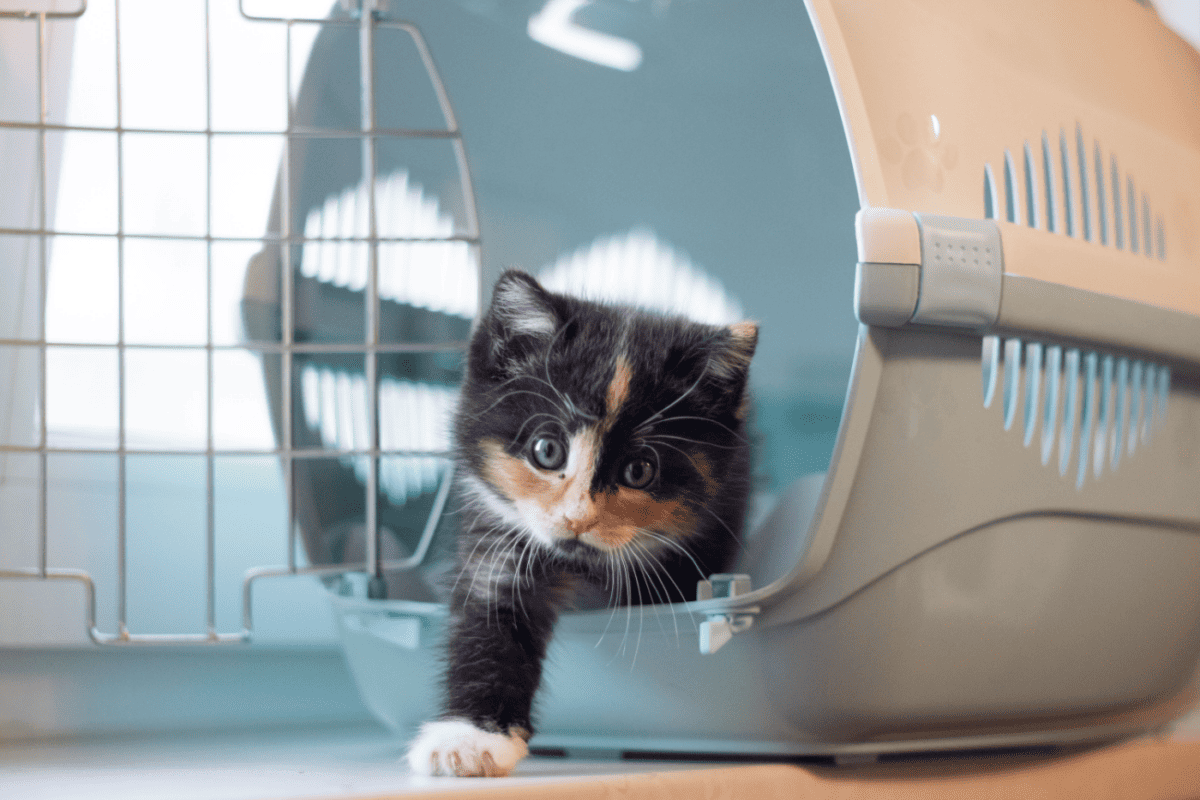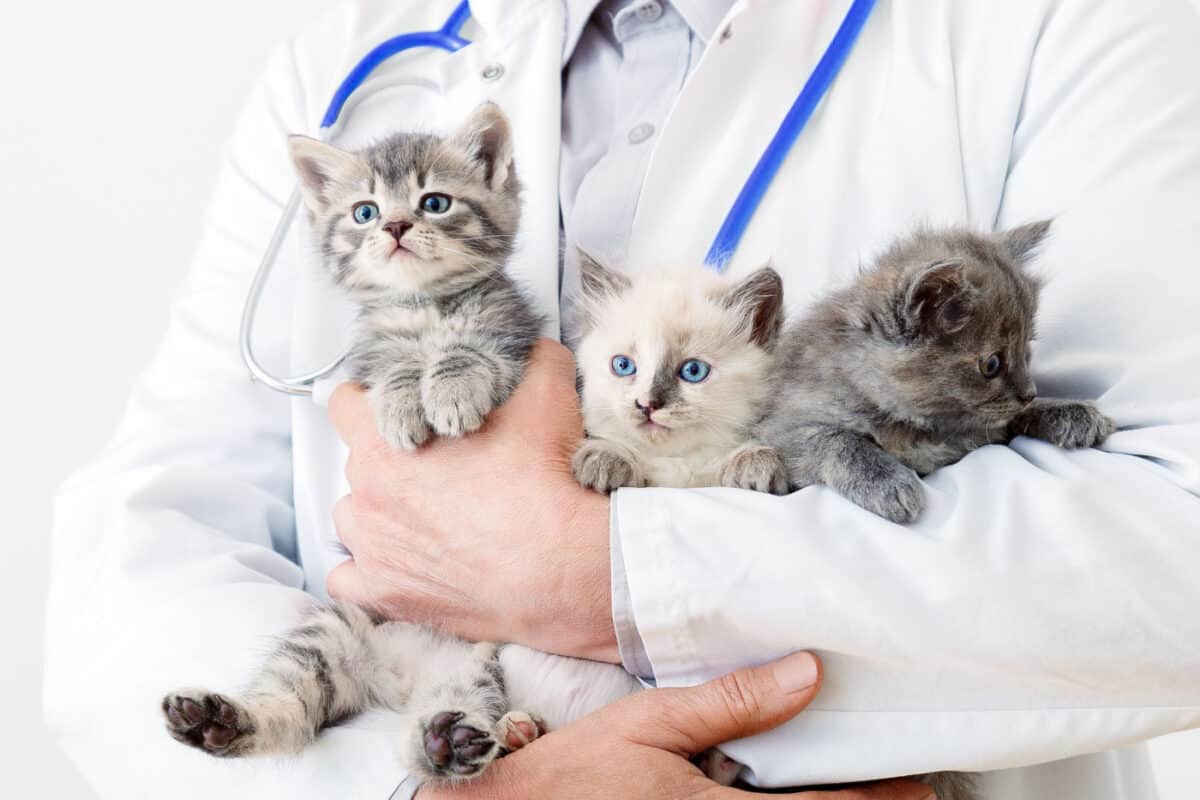So you've decided to adopt a cat. Congratulations!
Animal shelters and rescue groups have candidates waiting in line for you, all needing a loving home.
When visiting the shelter or browsing through lists of cats for adoption, you may wonder, "Should I adopt one of these adorable little kittens, or should I take in one of the sweet adult cats?"
That's a good question. Living with a kitten is different than living with an adult cat.
It can be wonderful for some people yet not so much fun for others. Let's review and pros and cons of each option so you can see which is a better fit for your lifestyle.
A cat is considered a kitten throughout the first six months of its life. To some extent, the behaviors described here can be displayed through the cat's first year and with some cats for even longer.
Most cats mature during the first year of their lives, but the second year may still be a mix of kittenish energy levels and more subdued adult behavior.
For the sake of this guide, we'll consider adult cats to be two years old and older.
The Pros And Cons Of Adopting A Kitten
Let's start with the good stuff first! Here's why adopting a kitten is a good idea.
1. Kittens are just so cute!
Let's face it. Kittens are adorable. We are biologically programmed to adore young babies, human or non-human, and most of us find that innocent "kittenishness" is almost irresistible.
2. Kittens are smaller and easier to handle.
This can be important for first-time cat owners who are still inexperienced. Kittens are lightweight and their claws and teeth are smaller compared to an adult cat's.

It's much easier to pick them up, get them into a carrier, or just place them in your lap.
3. Bonding is likely to be faster with a kitten.
At only a few weeks of age, they will be seeking out a "mother figure" and that can be you (it doesn't matter if you're a man or a woman). The younger the kitten, the more likely you are to be emotionally needed (and physically kneaded!) by your kitten.
4. Did we mention they're cute?
They're adorable and they're funny too. They will play with anything and everything, and explore every nook and cranny. If you have more than one kitten, you can be assured of hours of endless entertainment as they play with each other.

It's not all positive, though. Let's take a look at why adopting a kitten is a good idea.
1. Kittens have very high energy levels.
Younger kittens are limited by their physical abilities, but they turn into little demons once they are a few months old.
They jump on everything, climb everywhere, and will test every object in your home to see if it can be batted, pushed, or pulled.
Their curiosity knows no bounds, and their appetite for games is insatiable. It can take them a year, and sometimes even longer, to settle down to a more tolerable and less energetic lifestyle.

Until then you have to kitten-proof their environment to keep them safe and arm yourself with patience.
Read more: 13 Practical Ways to Kitten-Proof Your Home
2. Your hands and arms will get scratched and bitten.
Some of these games include playfighting. If your kitten doesn't have littermates to practice on, your hands and ankles will become likely targets.
That's why owners of kittens often have scratches on their hands. While you should set boundaries and re-direct that playtime aggression, you should also realize it's part of raising a kitten.
A kitten is not for you if you have delicate skin or tend to get infections.
SIGN UP FOR THECATSITE'S EMAIL UPDATES >
3. The kitten's character can still change.
You don't know what kind of adult cat this adorable active little kitten is going to turn out to be. He or she may seem playful and friendly now, only to turn into a grumpy cat or a timid shy cat.
Very experienced cat owners may be able to guess the future temperament of a kitten, but they can also get it wrong.
4. You could be seeing the veterinarian quite a few times.
The younger the kitten, the more likely you will be to deal with the initial health care issues of vaccinations as well as spaying/neutering.
Many shelters and rescue organizations won't adopt out a kitten until after it's been fixed and given the first round of shots.

If you adopt from another source, you will have to deal with these procedures yourself.
Young kittens are also more susceptible to sickness. Their immune system is only just learning about new pathogens and their digestive system is getting to know new types of foods.
Vomiting and diarrhea are more common in kittens than in cats. You may have to deal with issues such as food allergies or the discovery of genetic diseases that will accompany your kitten for his or her lifetime.
Injuries are another concern with kittens. They are delicate and their bones break more easily. They don't make a good pet for young children who may handle them too roughly and cause injury.
5. They're extremely energetic!
Did we mention high energy levels already? It's worth mentioning again because it is the most prominent difference between an adult cat and a kitten.
If you're not ready to have a wild little ball of energy wrecking your home, a kitten is probably not for you.
The bottom line is: Kittens can be way too much to handle, especially for first-time owners.
Adopting An Adult Cat
Time to consider the alternative: Adopting an adult cat. Again, let's begin by reviewing the cons.
1. The cat is out of the bag.
With an adult cat, you know what the cat's actual character is like and there are fewer surprises.
Shy and timid, or friendly and outgoing, the cat has established his or her temperament and if you adopt from someone who knows the cat, you know what you're getting into.
It's important to adopt from a foster home or a shelter where experienced staff can help you assess the real character of the cat you're interested in adopting.
2. Older cats are relaxed.
As cats grow up, they become calmer and eventually may even become sedentary. A lot depends on the specific cat's temperament but generally speaking, the older the cat, the less likely you are to encounter that crazy juvenile level of energy.
Older cats will still need exercise, and you should provide them with enough room to run, climb and get enough physical and mental stimulation, but they are less likely to try and climb your curtains and generally get into trouble.
3. Adult cats are healthier
Young adult cats - between the ages of 1 and 8 - are in the prime of their health. They are past the common health issues of kittens and are generally more robust.
They should already undergo neutering and vaccination, so there is no reason for you to visit the vet more often than once a year for their annual checkup.
Of course, adult cats can also become sick, so be prepared for any eventuality - just keep in mind that it's less likely to happen.
4. You could be saving a cat's life.
When adopting from a shelter, particularly a non-designated no-kill shelter, save a life by considering the adoption of an adult cat.
It's easier to find homes for kittens simply because they are so adorable and cute. People quickly adopt kittens, but they often leave adult cats in need of a home behind.
Why adopting an adult cat is a bad idea
Let's talk about the negatives too.
1. An adult cat may have emotional baggage.
Some of the adult cats in shelters and foster homes have a history of abuse and neglect. You can overcome everything with enough love and dedication, but it can be a long process.
That said, rescuing a previously abused cat can be an extremely rewarding experience!
Read more: How To Help An Abused Cat Recover
2. An adult cat could be set in his or her ways.
You'll have to accept that your cat may have a preference for a certain type of litter and a favorite kind of food.
It's entirely possible to work with them on changing these preferences but it's going to take time and patience on your part and it must always be a gradual process.
Just like people, the older the cat, the more set in his or her ways, so be patient with older cats, especially seniors.
The older the cat, the longer it's likely to take them to be introduced to another cat or to get used to being around pets of other kinds.
A kitten is a safer bet for a family that already has a ped bird or small furry animal.
Senior cats issues
Much older cats, those over the age of 8 years or even into the second decade of their life can be wonderful pets.
They are often sedentary and relaxed yet just as loving as younger cats. Most remain healthy well into their teens. However, prepare to visit the veterinarian more often and deal with age-related health problems as they arise.
Please consider adopting these cats, as they can make wonderful pets and deserve a good home.
Consider your lifestyle and your other pets
The bottom line is there is no "one size fits all" solution to the question. Some people enjoy the challenge of caring for a young hyperactive kitten.
For others, a cat that's more relaxed and set in his or her ways is a better option. If you already have one or more cats at home, or other pets, consider their needs too. How will they react to an energetic kitten?
Or perhaps they will be safer with a younger kitten who will gradually get to know and respect them? If it's another cat that you wish to match up a new cat with, do read our article on the topic: Your Second Cat How To Choose The Best Friend For Kitty.
Need more help with deciding? Share your thoughts and worries with us in the cat care forums where our members can help you figure out which is the right choice for you.
SIGN UP FOR THECATSITE'S EMAIL UPDATES >
Note: We may get commissions for purchases made through links on this page.




6 comments on “A Kitten Or An Older Cat – Which Should You Adopt?”